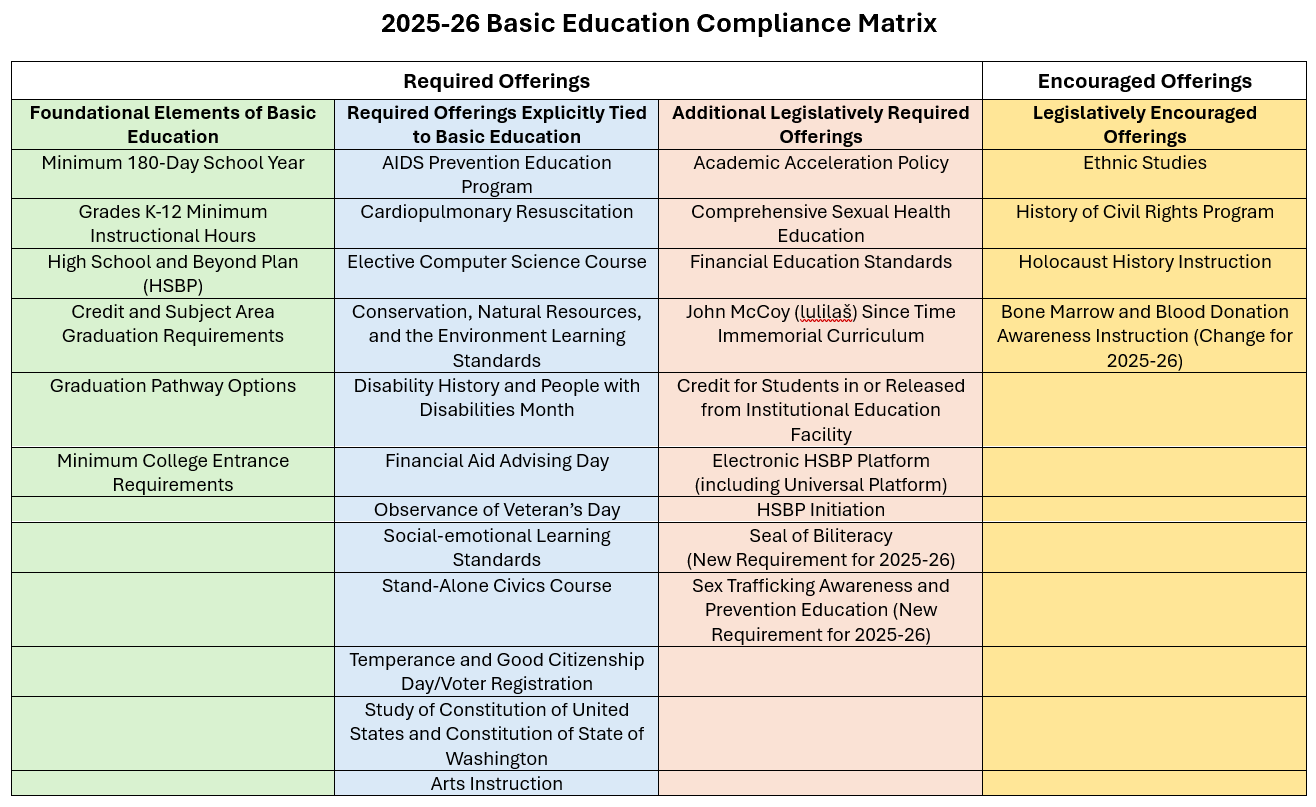Contact
Gail Wootan
Director of System Health & Compliance
The State Board of Education (SBE) is responsible for ensuring that Washington State public school districts and local education agencies are in compliance with the Program of Basic Education (RCW 28A.150). The SBE annually conducts a survey allowing school districts to affirm compliance with the basic education law. (WAC 180-16-195).
The Basic Education Matrix
Under the provisions of Chapters 28A.150, 28A.230, 28A.300, and 28A.320 RCW, the State Board of Education is tasked with developing a Basic Education Compliance Matrix. The Matrix includes criteria that guide recommendations for certificates of compliance or noncompliance with basic education laws. It identifies the foundational, required, and encouraged elements of basic education in Washington school districts:
The Board's 2025-2026 Basic Education Compliance Matrix lists four criteria that schools in Washington must follow to be in compliance with basic education laws. The criteria is as follows:
- The foundational elements of basic education are ones that must be present within the education program in every school district and LEA prior to a recommendation for certification of compliance.
- The required offerings describe elements which have an explicit basic education or compulsory education reference in statute, and the presence (or not) of the element factors into compliance recommendation.
- The additional legislatively required offerings describe elements that are related to basic education, are required elsewhere in statute, but do not have an explicit basic education reference. These do not factor into the certification recommendation and would result in a notification to the district.
- The encouraged offerings describe elements that are legislatively encouraged or recommended in the statute, and these do not factor into the certification recommendation
View the 2025-2026 Basic Education Matrix

| Documents & Links |
|---|
| 2025-2026 Basic Education Compliance Report (Jan. 2026) |
| 2024-2025 Basic Education Data Tables (Sept. 2025) |
| 2023-2024 Basic Education Report (Feb. 2024) |
| 2022-23 Basic Education Report (Feb. 2023) |
| 2021-22 Basic Education Report (June 2022) |
| Interpretive Statement on the Calculation of Instructional Hours (Aug. 2024) |
| Educational Offerings in Washington State — Required & Encouraged (Jan. 2025) |
| Instructional Hours FAQ & Accreditation FAQ |
Basic Education Compliance District Survey
The survey includes questions regarding access to the Program of Basic Education that allow the state to ensure that students are offered the full breadth of educational opportunities spanning the program of basic education, specific required or encouraged offering, and the state learning standards. The updated basic education survey includes the prompts about the following topics:
- Grades offered, days of instruction, and waivers.
- Instructional hours and climate surveys.
- Science instruction in the elementary grades.
- Graduation requirements: the High School and Beyond Plan, course offerings, and graduation pathways.
- State-mandated and state-recommended educational offerings and activities.
- Mastery-based learning and Washington-Integrated Student Support Protocol.
- 2023-24 graduation requirement emergency waiver administration.
Click Here to View the District Compliance Status List
(Updated 10/13/2025)
Instructions for downloading survey answers before submitting
Accreditation and Basic Education Certification
Basic education certification is a mandatory process and an integral part of work that the State Board is tasked to accomplish annually. This process is different from such procedures as accreditation or private schools approval. Accreditation is a process that a school district can follow voluntarily, whereas the process of approval is mandatory for private schools. Please find more information on accreditation on this page: Accreditation.

